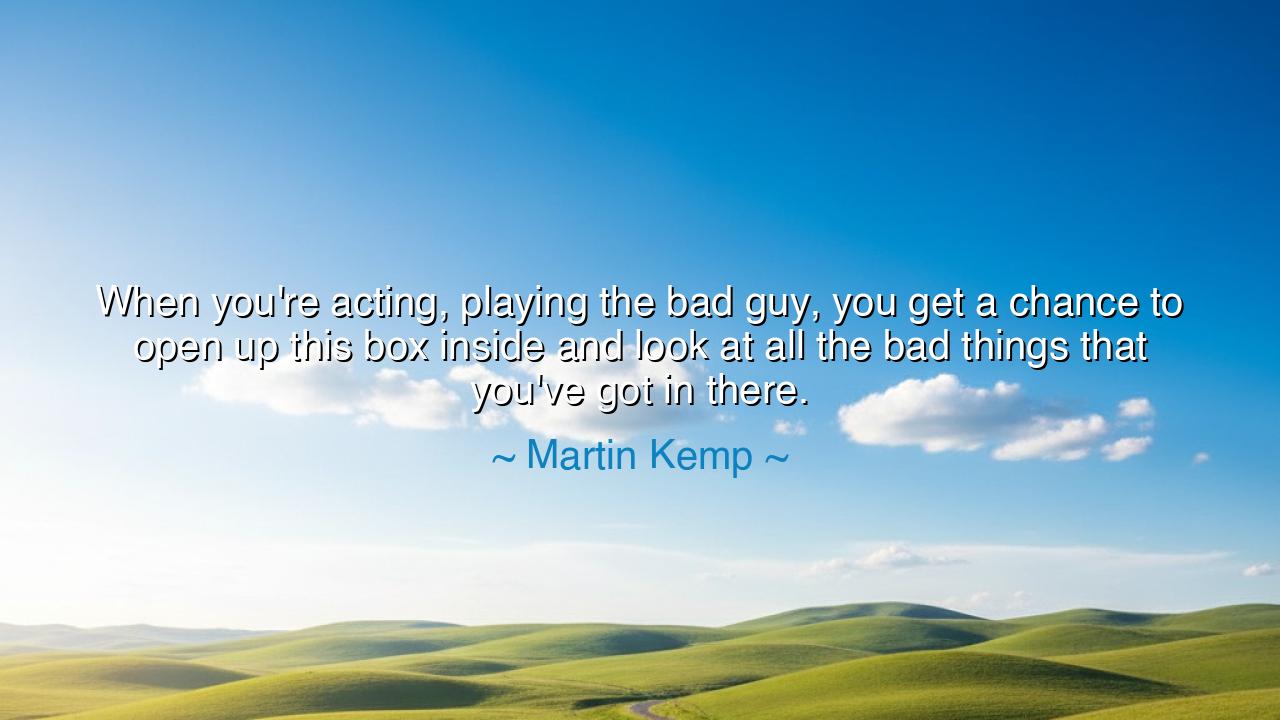
When you're acting, playing the bad guy, you get a chance to open
When you're acting, playing the bad guy, you get a chance to open up this box inside and look at all the bad things that you've got in there.






In the world of acting, there is a truth that runs deeper than the roles we play on stage or screen. The actor, much like a warrior or a philosopher, must delve into the depths of the human soul, confronting both its light and darkness. Martin Kemp, in reflecting on his craft, shared this powerful insight: "When you're acting, playing the bad guy, you get a chance to open up this box inside and look at all the bad things that you've got in there." With these words, Kemp reveals an essential truth about the nature of self-exploration and human nature. To truly understand the shadow of a character, one must first confront the shadow within themselves—the dark impulses, the flaws, the hidden desires—that make us human.
This idea has roots in the wisdom of the ancients, where philosophers like Socrates and Plato believed that self-awareness and self-examination were the highest pursuits of man. Socrates famously declared that "The unexamined life is not worth living." His teachings emphasized the need to look inward, to confront the truths that lie hidden within our souls, even the parts we might not want to acknowledge. Plato, in his dialogues, often explored the nature of vice and virtue, showing that to understand goodness, one must also understand its opposite, evil. Kemp’s words resonate with this ancient understanding: to play the villain on stage or screen is not just to mimic evil, but to explore the darker facets of our own nature, to open the box within us and confront those uncomfortable truths.
Consider the myth of Oedipus, the tragic hero of Sophocles. Oedipus, though noble and virtuous, was blind to the truth of his own actions. His journey, much like the actor’s, was one of self-discovery—but it was through his flaws, his impulses, and his inability to recognize the darker parts of his nature that he brought about his own downfall. Oedipus did not know the evil within him until it was too late. The ancient Greek tragedies remind us that true self-knowledge requires not just understanding our virtues, but also acknowledging our weaknesses, our fears, and our darker tendencies—the "bad things" that Kemp speaks of. Just as Oedipus confronts the dark truth of his fate, the actor must confront the darker parts of themselves to play the role of the villain convincingly.
This confrontation with darkness is not just limited to the stage or screen. It is an essential part of the human experience, and history is filled with individuals who have faced their inner darkness in order to become greater than they were. King David of Israel, for example, is remembered both for his strength and for his moral failings, most notably his sin with Bathsheba. But it was through his own recognition of his faults, his willingness to face the consequences, and his subsequent repentance that he achieved greatness. King David’s journey is a reminder that to face the darkness within us is not an act of weakness but one of profound strength, as it allows us to transform and grow into something greater.
The lesson from Kemp’s words is one of profound self-awareness: we must confront our own darkness to understand the world around us. The journey of the actor, like the journey of the hero, is one of discovery—both of the character they play and of themselves. It is in facing the villain within that the actor finds the truth of the role and the essence of the human condition. The great philosophers, poets, and artists of old understood that art was not simply about portraying life as it is, but about confronting the complexities and contradictions of the human spirit. Just as Kemp explores the depths of villainy in his acting, we, too, must explore the shadows within us to find the full spectrum of our potential.
In your own life, do not shy away from confronting your own darkness. Just as the actor plays the villain not to glorify evil but to understand it, you, too, must confront your own flaws, fears, and weaknesses. This process of self-examination may be uncomfortable, but it is through this discomfort that true growth happens. The act of looking at the “bad things” inside us allows us to integrate them, to move past them, and to become more whole. Self-awareness, as the ancients knew, is the path to wisdom, and understanding both the light and the dark within ourselves is the key to mastery over our lives.
So, as you move forward, remember that facing the shadow within is not a sign of weakness, but of strength. Like the great actors and heroes of old, dare to open the box of your inner darkness, not to be consumed by it, but to transform it. In doing so, you will not only gain greater understanding of yourself but also a deeper empathy for the human experience, and the world around you. Just as Socrates and Kemp taught, the path to wisdom lies in the willingness to look at what lies beneath the surface and to embrace both the light and the dark that shape us all.






AAdministratorAdministrator
Welcome, honored guests. Please leave a comment, we will respond soon